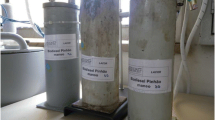Abstract
The aim of this work was to evaluate the influence of the purification process on the stability of Jatropha curcas biodiesel. The biodiesel was obtained using a variety of purification processes: three wet methods with different drying processes (vacuum oven, conventional oven and anhydrous sodium sulfate) and one dry method (purification with adsorbent magnesium silicate). Biodiesel was characterized through the analysis of carbon residue, acidity index, infrared and gas chromatography. The composition J. curcas oil indicated 56.3 % of unsaturated fatty acids and 43.7 % of saturated fatty acids. Jatropha oil presented high quantity of saturated acids, which are less susceptible at oxidation. The biodiesel sample that was chemically purified (PUsq) presented better purity, indicating be the process more efficient in remove the residues of synthesis. Thermogravimetric curves of purified biodiesel by wet method, PUsq, with chemical drying using anhydrous sodium sulfate, and PUsv, with vacuum drying, showed the highest initial decomposition temperatures, indicating higher thermal stability. The carbon residue and infrared analyses suggested that contamination by catalyst residue is a determining factor in reduction of the oxidative stability of biodiesel. The oxidative stability was evaluated using Rancimat and pressure differential scanning calorimetry. Biodiesel samples showing better oxidative stability were purified using PUsq and PUsv, which obtained stability of 6 h using the Rancimat technique, the minimum limit set by Brazilian legislation, without the addition of antioxidant, suggesting that these methods least influenced the stability of biodiesel.








Similar content being viewed by others
References
Yin X, Duan X, You Q, Dai C, Tan Z, Zhu X. Biodiesel production from soybean oil deodorizer distillate using calcined duck eggshell as catalyst. Energy Convers Manag. 2016;112:199–207.
Silva JC, Gondim AD, Galvão LP, Evangelista JP, Araujo AS, Fernandes VJ Jr. Thermal stability evaluation of biodiesel derived from sunflower oil obtained through heterogeneous catalysis (KNO3/Al2O3) by thermogravimetry. J Therm Anal Calorim. 2015;119:715–20.
Kok MV, Topa E. Thermal characterization and model-free kinetics of biodiesel sample. J Therm Anal Calorim. 2015;122:955–61.
Escorsim AM, Cordeiro CS, Ramos LP, Ndiayea PM, Kandaa LRS, Corazza ML. Assessment of biodiesel purification using CO2 at high pressures. J Supercrit Fluids. 2015;96:68–76.
Gomes AF, Gomes MP, Souza LD, Costa M. Thermal and chromatographic characterization of biomass, lipid material, and microalgal biodiesel from Monoraphidium sp. J Therm Anal Calorim. 2015;119:1861–6.
Atadashi IM, Aroua MK, Aziz AR, Sulaiman NMN. Crude biodiesel refining using membrane ultra-filtration process: an environmentally benign process. Egypt J Petrol. 2015;24:383–96.
Bueso F, Moreno L, Cedeño M, Manzanarez K. Lipase-catalyzed biodiesel production and quality with Jatropha curcas oil: exploring its potential for Central America. J Biol Eng. 2015;9:12–20.
Martins GI, Secco D, Tokura LK, Bariccatti RA, Dolci BD, Santos RF. Potential of tilapia oil and waste in biodiesel production. Renew Sustain Energy Rev. 2015;42:234–339.
Alves MJ, Cavalcanti ÍV, Resende MM, Cardoso VL, Reis MH. Biodiesel dry purification with sugarcane bagasse. Ind Crops Prod. 2016;89:119–27.
Atadashi IM. Review: purification of crude biodiesel using dry washing and membrane technologies. Alex Eng J. 2015;54:1265–72.
Manique MC, Faccini CS, Onorevoli B, Benvenutti EV, Caramão EB. Rice husk ash as an adsorbent for purifying biodiesel from waste frying oil. Fuel. 2012;92:56–61.
Veljković VB, Banković-Ilić IB, Stamenković OS. Purification of crude biodiesel obtained by heterogeneously-catalyzed transesterification. Renew Sustain Energy Rev. 2015;49:500–16.
Fregolente PBL, Maciel MRW. Water absorbing material to removal water from biodiesel and diesel. Procedia Eng. 2012;42:1983–8.
Ramalho HF, Suarez PAZ. A química dos óleos e gorduras e seus processos de extração e refino. Rev Virtual Quim. 2013;5:2–15.
Ismail SAA, Ali AFM. Enhancing oxidative stability of biodiesel samples subjected to cations contamination during storage using Lantana camara L. (Verbanaceae) leaves extracts. Biochem Eng J. 2016;110:143–51.
Candeia RA, Conceição MM, Dantas MB, Souza AG, Sales LLM, Macedo FL. Thermal characterization of oil and biodiesel from oiticica (Licania rigida Benth). J Therm Anal Calorim. 2011;104:1580.
Gonçalves MA, Gonzaga FB, Fraga ICS, Ribeiro CM, Sobral SP. Avaliação de Laboratórios Brasileiros na Determinação de Alguns Parâmetros de Qualidade de Biocombustíveis. Quim Nova. 2013;15:1–7.
Arruda F, Beltrão N, Andrade A, Pereira WL, Severino LS. Cultivo de Pinhão Manso (Jatropha Curca L.) como alternativa para o Semi-Árido Nordestino. Rev Bras Ol Fib. 2004;8:789–99.
Kalasinsky VF, Jenkins HM, Johnson FB. Applications of vibrational microspectroscopy to pathology specimens. Rev Vib Spectrosc. 2012;28:199–207.
Dasari SR, Borugadda VB, Goud VV. Reactive extraction of castor seeds and storage stability characteristics of produced biodiesel, Process Safety and Environmental Protection. Process Saf Environ Prot. 2016;100:252–63.
Araújo BQ, Nunes RC, Moura CV, Moura EM, Citó AMG, Santos JR Jr. Synthesis and characterization of beef tallow biodiesel. Energy Fuels. 2010;24:4476–80.
Sousa FP, Luciano MA, Pasa VMD. Thermogravimetry and viscometry for assessing the ester content (FAME and FAEE). Fuel Process Technol. 2013;109:133–40.
Stojković IJ, Stamenković OS, Povrenović DS, Veljković VB. Purification technologies for crude biodiesel obtained by alkali-catalyzed transesterification. Renew Sustain Energy Rev. 2014;32:1–15.
Saeed K, Pullen J. An overview of biodiesel oxidation stability. Renew Sustain Energy Rev. 2012;16:5924–50.
Lizama TV, Ballote LD, Mézquita EH, Crespo FM, Borges PC, Atoche AC, García GG, Maldonado L. Thermogravimetric analysis as a rapid and simple method to determine the degradation degree of soy biodiesel. Fuel. 2015;156:158–62.
Agarwal AK, Khurana D. Estabilidade a longo prazo de armazenamento de oxidação karanja biodiesel com o uso de antioxidants. Tecnologia de Processamento de combustível. 2013;106:447–52.
Yaakob Z, Narayanan BN, Padikkaparambil S, Unni SK, Akbar MP. Rancimat and PDSC accelerated techniques for evaluation of oxidative stability of soybean oil with plant extracts. J Therm Anal Calorim. 2013;114:827–32.
Acknowledgements
The authors thank Conselho Nacional de Desenvolvimento Científico e Tecnológico (CNPq) and Comissão de Aperfeiçoamento de Pessoal do Nível Superior (CAPES).
Author information
Authors and Affiliations
Corresponding author
Rights and permissions
About this article
Cite this article
Cordeiro, D.O., Gondim, A.D., Araújo, A.S. et al. Influence of the purification process on the stability of Jatropha curcas biodiesel. J Therm Anal Calorim 127, 1253–1260 (2017). https://doi.org/10.1007/s10973-016-5861-4
Received:
Accepted:
Published:
Issue Date:
DOI: https://doi.org/10.1007/s10973-016-5861-4




